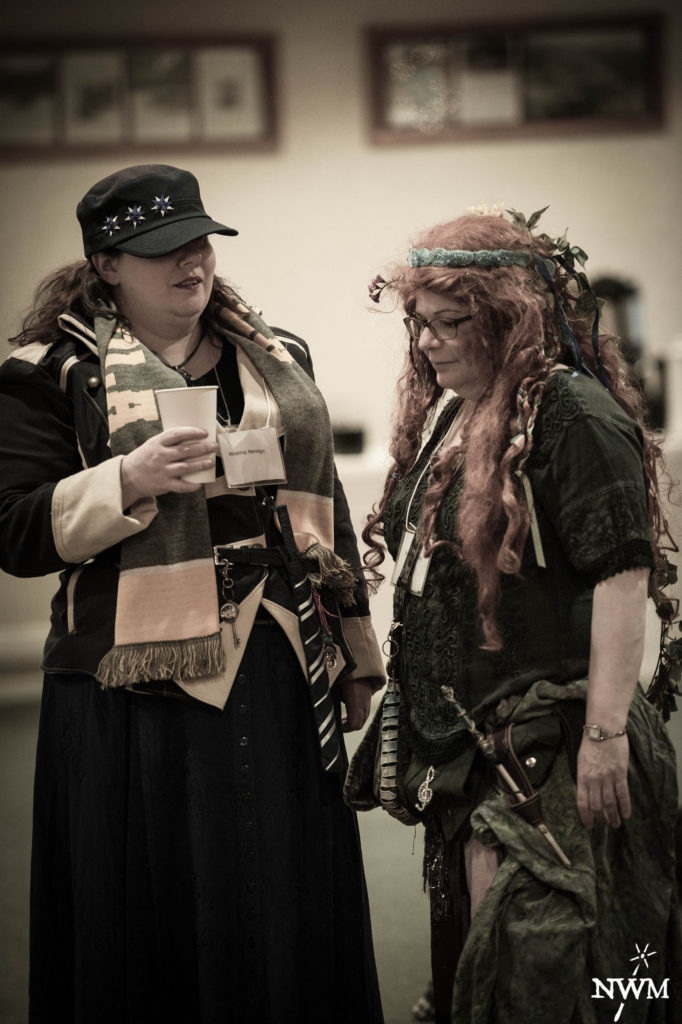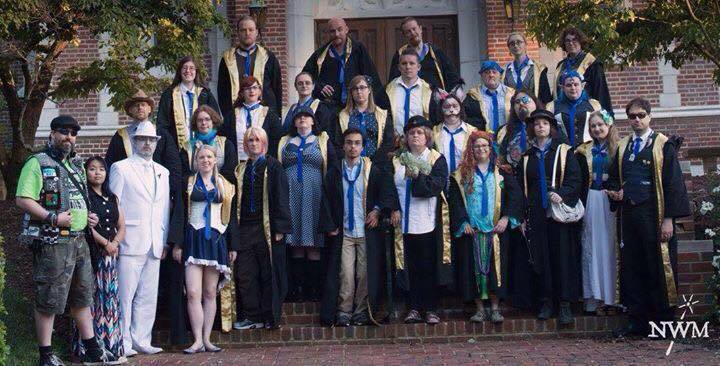Run 5 (Second Semester) of New World Magischola was the most transformative role playing experience of my decade-long LARPing career. While I went into the game as prepared as possible for an intense, dark plot and a romantic story ending in heartbreak, my primary game experience revolved around internal and external validation and the availability of choices in a world without sexism.

I chose to leave my character’s alignment up to her house. Photo: Heather Fesmire
Transformative role play provides meaningful change in a player’s life or way of thinking as the result of the emotions and experiences of the character they portray. Some experience this at New World Magischola, a live action role playing experience during which players portray students at a magical college. This reflects my experience during a second semester run, which included my character’s graduation.
Content warning – This post discusses the following topics in the context of the real world: sexism, emotional abuse, chronic illness, healthcare in the U.S.
Last year at the first semester run, I chose to deliberately explore grief over a relative who had passed away. This year, I had not intended to explore validation and closure as part of my experience, but that’s what happened. In my desire to ‘tie up plot’ before my character graduated from New World Magischola, I explored a sense of closure I rarely get in the real world. I accomplished this in several ways:
- Scene request: disapproving parent
- Romance: ending on good terms (this wasn’t planned on my part, but it worked out that way)
- Graduation: accepting a diploma and a job as my character
- House plot: frontloading drama for my character’s house early in the game to inspire an immediate sense of unity and allow more time for closure
- Emotions: accepting a curse that would require other characters to help mine determine how to understand her own emotions, thus redefining her relationships
Character and Summary: Minerva Hennigan
Aggressive, Willful, Loyal

Minerva (left) chatting to her best friend Delilah. Photo: New World Magischola, Darren M. Fitzgerald Photography
At New World Magischola, players portray characters with preassigned backstories. The backstories have some solid facts, but ultimately the details are up to the player.
This was my fourth event as Minerva, including a sanctioned player-run spinoff event and Yuletide Escapade. As a mixed heritage mage in a stratified magical world, Minerva had the opportunity to attend wizard college at the progressive New World Magischola. Coming from a traditional family of adequate (but not exceptional) funding and social capital, she struggled with themes of acceptance, but followed the law as it was written in her pursuit of becoming a marshal like her father. After this event, she may appear at extraneous events, but not at the college itself.
I chose to play Minerva as very serious and grey-aligned; she was involved in some shady business but committed no major actions or crimes against others. The product of an emotionally distant household and workaholic parents, Minerva connected with a similarly detached mentor who led her house in the previous semester. When he became imprisoned, her emotional state was essentially reinforced: until she met someone who made her smile at Yule. This close friendship and ensuing romantic feelings were surprisingly welcome, but Minerva had no way to emotionally cope with these feelings without the help of other people.
As a marshal intern, Minerva also experienced a great deal of trauma between events, bearing witness to gruesome scenes. Eventually, emotions became exceptionally difficult for her and a curse magnified this problem at run 5.
As my character is quite loyal to her house, I chose to let the other characters and their choices define whether Minerva would go into the world as a dark and resentful wizard or the opposite. Due to the strong emotional support of her peers, Minerva learned to process emotions in a balanced capacity and went into the world with a better sense of managing her own rage.
About the Player: Me
Creative, Compassionate, Loyal

Me in real life.
Like Minerva, my life is largely defined by my work ethic.
I lost my main source of income two days before the event. I’m a professional storyteller working in marketing to help brands tell their stories, and these LARP experiences allow me to help traditional businesses in innovative ways.
My first run of New World Magischola occurred a month after the dissolution of a seven year long marriage involving a great deal of emotional abuse. As a result, playing a powerful character with her own agency has been more important to me than playing a character who is well-liked. I know I need to internalize the confidence and self-respect of Minerva, and after playing her, I always welcome that particular aspect of bleed.
Last year I noticed a difference in how I viewed myself after playing this character. While it didn’t erase self-hate, self-confidence issues, and the generally low view of myself that resulted from years of an unhealthy relationship, it really propelled me to ease up on my negative self-talk and use LARP as a tool in conjunction with occasional therapy sessions with a licensed counselor.
Now that I have a certain amount of control over how I see myself (I didn’t go into a spiral of self-hate when I lost my job), I’m trying to focus on limiting the need for constant acceptance and external validation as it holds me back in my personal and professional life, but still understand that some validation is essential and crucial. Sometimes I have a hard time differentiating between seeking approval I shouldn’t need and asking for help or reassurance in a healthy way.
My exploration of this at NWM5 was unintentional, but powerful and defining.
The Impact of a World Without Sexism: Reduction of External Validation Needed
Choices have consequences in the game world, but sexism isn’t one of the choices or consequences characters face or play with. The absence of sexism provided Minerva with a sense of agency that I am not accustomed to in the real world. Although she did have a need for external validation primarily from men (I’ll get to that later – it’s complex!), it was noticeably lessened without the presence of the patriarchy. Here’s how:
Minerva’s Father: Marshal Brogan Hennigan
Psychologically, this is an ideal place to start for any analysis of character or player, especially when we’re looking at how men treat women in the game world and in the real world.
Minerva’s father was present for a fair portion of the game as a representative of the marshals. Although he was stern, imposing, and gruff to Minerva and other students, he repeatedly emphasized her agency and treated her competency as normal, when it was present. When speaking to her date to the dance, for example, he provided a threat – but the threat was Minerva’s skill and action rather than anything he would do.
During their initial conversation, Minerva’s father asked her about the top marshals he should look at recruiting, and one of them happened to be her romantic interest.
Her father ended that discussion with:
“He’s fun for college, but you need to get ready for the real world.”
When I think about how things might have gone for Minerva in regards to the romantic interest without that piece of advice, the path to heartbreak is much more likely than the mature closure the pair was able to achieve. This advice was also in contrast to the that of her peers, who really wanted her to go for broke in pursuit of a relationship with someone above her social class two days before graduation.
I can’t help but think how rare it would be for a father to give his daughter this kind of advice in the real world, where a son might have the advantage of hearing it frequently. So while Minerva’s father was incredibly strict, protective, and restrictive and other students thought he was a real jerk, he wasn’t sexist, and that allowed Minerva to make her life to be about herself rather than put a crush at the center of it. Without her father’s active intervention, she may have. (It’s also worth noting that while this particular situation surrounded a heteronormative potential pairing, there is no bias against sexual orientation in this world.)
In the real world, I don’t have a relationship with my father at all. From what I do recall, however, a message of agency and decision-making about my own body were not necessarily what I got from him regarding dating, and I know this is the norm for many women and girls.
I’m sure any psychologist would have a field day with this, of course. As I was able to play out a parent-child relationship and a romantic interest in the same game, I was amazed to feel (and internalize) the impact of Minerva’s father’s encouragement to make her own choices about relationships secondary to her career. It impacted her happiness and her alignment.
I should also note that I’ve had difficulty verbalizing an explanation for my character’s uncharacteristically calm response to the romance failing, and days after the end of the game, it remains a sticking point for many who played characters close to the couple that might have been. Hopefully the above provides some closure for the players whose characters saw the almost-relationship as a symbol or goal for their own characters, or who found it important to their own stories for any other reason.
Asking for Help: Guilt versus Guilt-Free
In real life, I feel guilty for asking for help with the simplest of favors. It takes a fair amount of emotional labor to debate about asking someone to do something, followed by the time it takes to feel guilty over having asked. Even as I was asking a friend for input and character observation on this very topic, I felt bad.
This type of guilt easily wears away at me in any sort of leadership situation. When the very process of leading creates more stress than doing small tasks myself, I end up in the impossible situation of feeling guilty or feeling stressed. Good leaders don’t have trouble asking for help most of the time, and in our real world, men are conditioned to lead and women are taught to be helpers. As a woman who takes on leadership roles, I find this constantly challenging.
As Minerva, I was able to lead with less stress and effort because I didn’t feel guilty every time I asked people to do something. It was clear that I was there to lead, not help, and that nurturing others was a role that went strictly to another character. As a house president, Minerva understood that proper delegation wasn’t an inconvenience; it provided stability to the people who looked to her for guidance. I’m told that this leadership style and Minerva’s overall confident and aggressive demeanor left most others feeling inspired by her confidence – and they also primarily felt that Minerva herself did not need external validation.
While it was hard for Minerva to ask for help due to the trouble she experienced with her emotions, there wasn’t guilt there once she did it.
External Validation: The Surprising Thing Minerva Needed
Competent, self-assured, job offer in hand, leader of a house: these terms described and defined Minerva. One reason so many other characters were invested in her romantic plot was because this stoic character finally displayed an actual weakness for someone or something in a way that was healthy rather than a way that involved loyalty with some barbed wire strings attached.
As the player of a character coming from such an emotionally distant home life (which I thought a lot about, because despite having an absent father, my mother provided a creative and emotionally stable environment for me), I thought it was rather obvious that Minerva would need some kind of external validation. In truth, even I wasn’t sure what kind of validation she needed to hear, but it was obvious she needed it.
- What I thought she needed: Compliments about her leadership skills (may have been some player-to-character bleed there); reassurance from her professors that she was ready to go into the real world; an acknowledgement that she was a valuable member of the magical community; a push to go beyond the status quo because of her exceptional gifts.
- What she really needed (and got): Acceptance and love from her father; others taking risks to save Minerva’s career and reputation; validation of doing the right thing from an actual jury of her peers; a very sincere talk about her competence and capabilities from the romantic interest/close friend; thanks and special attachments from her mentees (possibly to validate the type of relationship she had with her own mentor); the support of her house during a trial; compliments about her leadership skills.
The only firm crossover was the reassurance of her competence as a leader.
Following the game, myself and some others were surprised to learn about how much external validation this character needed. She carried herself so confidently. While she faltered and failed on occasion, she never missed a beat. Others envied her ability to rally her house (albeit around very deep, private, emotional needs known only to them).
I should also note that the players of Minerva’s closest friends were far less surprised that she required external validation, but Minerva herself and most other players and characters seemed to think that her internal validation was her primary strength and may not have needed support.
This forever changed the way I view exceptionally confident people and their reasons for needing emotional support and validation. It has little to do with a need for attention and everything to do with the fact that leaders need support when they’re bolstering an entire group. A leader’s needs become secondary when the group has to come first.
The Transformative Moment: House Support
My most transformative experience in this game occurred hours before Minerva was about to be put on trial for using an illegal spell. She’d saved a student’s life using a spell only accredited marshals may use, but she still had a few days before she would become a marshal herself.
Prior to the trial, Minerva sat with her house in the common room. She’d checked in with everyone to see what they needed, and then she did something incredibly difficult: she’d asked for help and support, and for her housemates to show at her trial. For the first time, Minerva displayed an emotion other than rage or protectiveness in front of a large group of people as she was moved to tears, but of course they rallied behind her.

Run 1 Maison DuBois. Photo: New World Magischola
This wasn’t a group that had marginal enthusiasm for supporting one of their leaders – this was a group that carried her through one of the most difficult times of her life without question.
The external validation for Minerva was this: she was worth fighting for. Her house members sat on either side of the bench and one even enthusiastically defended her as her lawyer, driving home the message of value.
External Validation, Faction Loyalty, and Bleed
Faction loyalty has always been one of my favorite things to play in a LARP. I like to think it’s my strength as a player, and I’m always interested in exploring why I’m so fascinated by this topic. Is it because I have always had friends but never a “Breakfast Club” style group? Is it a clannish remnant of my Irish American heritage? Ultimately, the need to belong is intense, and LARPs like NWM provide a background for exploring identity as a member of a group for me, beyond checking “white,” “female,” “college educated” boxes on a job application or census form.
In the past, I’ve been involved in kingdoms, houses, groups, and clans to varying degrees of success in LARP, usually finding some form of fulfillment by playing a role in them. As recently as last year at other LARPs, some characters and players threw some pretty hurtful words at my character and me regarding the leadership abilities of my character (and myself), so I approached the role of house president at such a prestigious game with a very deep amount of respect. I put a lot of effort into it.

Maison DuBois: New World Magischola | Learn Larp LLC
I took a risk.
And my effort was recognized and validated in and out of game.
This, I knew – this external validation is the healthy kind, and I’m reveling in this aspect of bleed and convincing myself that it’s okay to take a little credit for Minerva’s accomplishments.
Here’s why it counts:
In the real world, I suffer from chronic illnesses. Thankfully, I am still able to work and participate in extracurriculars like LARP. However, I am keenly aware that my government wants to remove my access to healthcare.
I wake up every day knowing that my government doesn’t think I’m worth the investment of keeping alive.
My government doesn’t think I’m worth fighting for.
My government doesn’t think I have enough value.
My government wants me to die.
This echoes many other harmful things expressed to me in the past, on a more personal level. It permeates every aspect of my life, from my ability to work to the state of my mental health.
Men in power want absolute control over my body, and they don’t think my body is worth much.
For various other plot and story reasons, I knew my character’s house wanted someone to rally behind. They’d been unable to redeem a previous house president, and I was able to give them the chance.
As a woman, I’m constantly bombarded by media showing me how women need to emotionally ‘fix’ and ‘save’ and ‘redeem’ men. Not only was I able to learn that Minerva needed to accept a fix for it to work (i.e. it was ultimately up to her), but also that women can be strong, emotionally distant, and in need of saving in that regard. This role isn’t limited to men, and that’s especially important as women are marginalized and devalued constantly in the real world.
It was incredibly moving to see her house come to her aid emotionally.
The message that bleeds through is that I do have value. That board of men overseeing women’s healthcare may think I’m worthless, but the truth is that I am worth fighting for, and that fight is not one I have to face in solitude.
On a personal note, I need to thank every single player who played a character in Maison DuBois in NWM5. I’ve tried and failed many times to express how much the honor of playing a DuBois house president has meant to me and why. I hope this does the trick. Together we’re strong!





